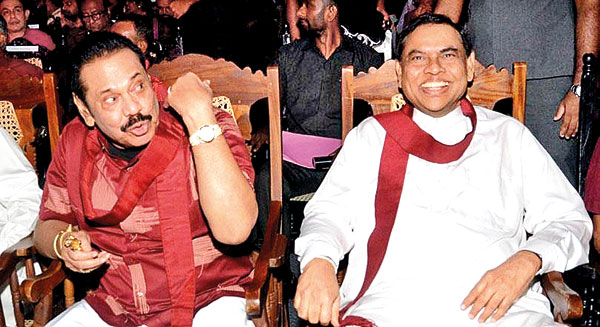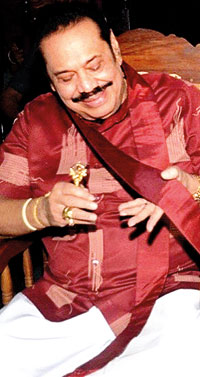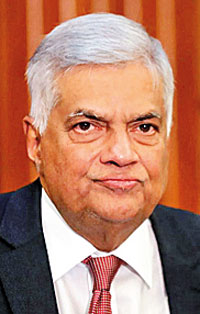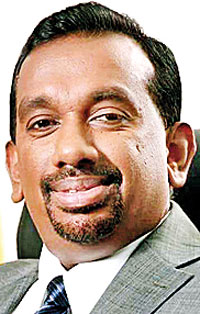SLPP celebrations an affront to Supreme Court judgment
View(s): 490
 If the accursed SLPP partymen bore any remorse that the three leading lights of the party— Mahinda, Gotabaya and Basil—had been found by the Supreme Court last month as the architects of Lanka’s economic collapse, they showed no sign of it as they wound their way to the Sugathadasa Stadium to attend the annual convention of the party faithful on Friday.
If the accursed SLPP partymen bore any remorse that the three leading lights of the party— Mahinda, Gotabaya and Basil—had been found by the Supreme Court last month as the architects of Lanka’s economic collapse, they showed no sign of it as they wound their way to the Sugathadasa Stadium to attend the annual convention of the party faithful on Friday.
If they felt any guilt, as they made their way to the makeshift pantheon in Bloemendhal Street to sing hosannas to the idolised Trinity of their fervour and faith, they should have felt its weight as heavy as the cross of economic burdens borne on their shoulders as a result of their icons’ actions.
But intoxicated in the Mardi Gras of their party’s annual, no expense spared, celebrations, they did not show the slightest tinge of guilt nor shame to be part of the brutish herd from whom reason had fled.
Where they should have beaten their breasts and shown catharsis and wept endless for the sins they had brought upon the Lankan people and begged forgiveness for their mass folly to have elected their tinsel heroes to office, they clapped their hands and, in demanding an encore, showed instead, they had neither learned from their errors nor realised the extent of the damage they had wittingly or unwittingly inflicted on the economic landscape.

JOLLY GOOD FELLOWS: And then there were two… Mahinda and Basil, with Gotabaya conspicuously absent, brimming with cheerful smiles at Friday’s grand convention
But what they strived to show most of all with over-the-top ostentatious celebration, which had towns and lampposts decorated with Pohottuwa flags, was the utter contempt with which the leaders held towards last month’s Supreme Court’s 4-to-1 judgment which had damned the Rajapaksa’s beyond the political pale.
The mass celebrations held throughout the country with mini conventions staged in every district, amounted to nothing more than an undisguised attempt to camouflage the judicial verdict with a plethora of colours and dancing on the street entranced by the Rajapaksa magic. The seemingly joyous celebrations, the tub-thumping, the slogan shouting in support of the Rajapaksas to convey to the rest of the masses that the SLPP didn’t give two hoots to the judiciary’s verdict. The put-on air of nonchalance was an insolent slap on the judicial face.
On November 14, five learned law lords of the Supreme Court had delivered the considered opinion of the bench with one dissenting judge, that the three Rajapaksas, along with five others, including former Central Bank Governor Nivard Cabraal, had ‘by their actions, omissions, decisions and conduct demonstrably contributed to the economic crisis.’
This ultimate Supreme Court condemnation should have made SLPP leaders, together with its rank and file, turn this year’s convention into an occasion to contemplate where they went wrong. To probe how a party that had won a record number of votes at both presidential and general elections just four and three years ago had so swiftly fallen out of public favour and sunk to rock bottom in the popularity polls.

MAHINDA: Rolling the mystic talisman to and fro on his palm
But they did not use it as a time for inner reflection, a time to reconcile with truth and to ‘focus on honesty, owning up to injustices and harms, and engaging in a process to repair, rebuild and restore lost public confidence.’
Instead, they preferred to remain in self-denial and turned it into a carnival to reaffirm the infallibility and omnipotency of the Rajapaksa faith, purge from the minds of the remaining faithful the damning Supreme Court verdict, instill, instead, that the good old corrupt halcyon days will soon return again.
In fact, the effort to underplay the Supreme Court damnation and debase its value had begun early in the week, in the build-up to the annual convention’s climax.
In an interview published in the Lankadeeepa on Monday, SLPP Secretary, Attorney-at-Law Sagara Kariyawasam declared, at the risk of contempt of court: ‘The Supreme Court gave the decision based on a collection of affidavits. And even then, one Supreme Court Justice has given a dissenting opinion. Therefore there is no definite judgment expressed by the Supreme Court.’
What on earth gave him the notion that a dissenting opinion by one judge of a five-judge Supreme Court bench, effectively renders the unanimous judgment of the other four judges as lacking legal force? That only a unanimous judgment by the entire five-judge bench would stand as a compelling judgment, the ratio decidendi or the rationale for the decision would serve as a binding precedent to be followed in subsequent cases?
According to SLPP Secretary Sagara’s befuddled legal opinion, one dissenting judgment would be akin to one drop of dung flung into a pot of pure milk, enough to make the milk undrinkable. Of course, to Sagara’s cultivated political taste buds, the Supreme Court judgemnt, even if it had been unanimous, would have remained yet unpalatable.
He further stressed: ‘The Pohottuwa is still in the people’s heart.’ Perhaps, but the Pohottuwa, for sure, is still in the people’s curses.
At the Sugathadasa Stadium after a long drawn pageantry of song and dance, began the pomp. Sagara introduced Mahinda as the second national hero—the first being Anagarika Dharmapala—and then started to pour praise from flattery’s cornucopia for ending the war, for building ports and airports. Addressing Mahinda, he said, ‘One day in another fifty or hundred years, they will make films on you, your life will be chronicled in distinct chapters in school textbooks. People may call you “rogue, rogue” today, but remember there is an army of supporters to protect you’.
Alas, it only needed the now demised Jackson Anthony to trace the Rajapaksa family’s gynecological line and connect it to Gautama Buddha’s Sakya family—as he once unblushingly did in 2011—to deliver the full and ultimate complement of the highest praise.
Mahinda took up the baton and continued from where Sagara had left off and, in a spot of self-praise, said: ‘In the 30-year war, no other leader could fight face to face against Prabhakaran. Some leaders even gave arms to Prabhakaran to stop the war. I shall not ask who.’
Neither is it necessary for anyone to ask who gave arms to Prabhakaran to stop elections in Jaffna? One of SLPP’s own Ministers may have the answer as to who.
As for Basil, he vowed to establish a bold strong Government when elected again and, assuming the lion’s mane, said: ‘When a stone is thrown at a dog, it will bark and run away. But when a stone is thrown at a lion, it will turn back and explore who did it.’
Small correction. When you throw a stone at a dog, not all dogs run away. Some turn back and attack. Only crows fly away. Some fly to faraway lands even as distant as the United States.
All these stirring speeches full of morale-boosting phrases, which may have once served to inspire a crest fallen people, now sounded hollow and hackneyed, as dull as dust. A rehashed edition with a new cover that failed to capture the imagination. The body was there but the soul was dead, its magic fled.
As the old faithful guard made their way back home in the falling rain, tired and weary after marking the roll at the stadium, perhaps, they wondered, with the last ounce of sanity left in them, if there was any force in heaven or earth that could make the summer sun’s wilted bud, bloom in the winter chill?
And pondered whether they had heard not a rousing call to arms but the last sad wail of the party leaders’ swan song.
All the VAT for New Year with love from President
It was all the VAT for the forthcoming year with love from the President as he sent his early New Year greetings to dampen the spirit of 22 million citizens who had harboured the fond hope that next year, at least, would be better than the preceding one. That things could not get worse. It did. : And to ensure the gravity sunk in, it was accompanied by the familiar refrain, ‘difficult times are far from over.’ It was all that was needed to give a rousing kickoff to a dawning new year replete. 
PRESIDENT: Plans for a Brave New Lanka If that was the hamper the people received from their Government, they little realised it was one more giant boulder they would have to carry to lay the solid foundation upon which their future will be built. Alas, what future can those who eke out a hand-to-mouth existence see, when they cannot see a future beyond their present meal? They can hardly be blamed if they fail to realise that the nation-building endeavour calls for great sacrifice from the masses and that it is not merely the pastime of a well-fattened Parliament whose privileged members continuously seem to live beyond not only the nation’s means but even beyond their own. No doubt, the IMF had demanded stringent reductions in public spending to reduce the budget deficit. But has the Government made any concerted effort to cut back on the rich lifestyles of its own cadres, taken action to curb wastage and, most of all, taken deterrent legal measures to eliminate corruption, and shown, apart from hollow words, zero tolerance towards this institutionalized curse which the IMF identified in its forensic report two months ago, as the biggest drain on Sri Lanka’s meagre resources? Or has the Government, instead, taken the easy way out to safeguard its own privileges and perks and reduce the shortfall by treating the Lankan public as an always available convenient, helpless, muzzled scapegoat with the cornucopian horn of plenty to nourish the Government’s inexhaustible wants while, simultaneously, piling load after load of intolerable taxes upon its slender back without any concern as to what moment it will snap? The people would have more stoically borne the burdens imposed if they were informed, as done in certain Western countries, on the exact areas in which their hard-earned money would be spent, and the following year given a realistic assurance that it had been utilized for the purpose it had been raised rather than given the flimsy pretext of building visionary edifices in the air for the people to wake from the utopian dream to the most prosperous and powerful state on earth in the miracle year 2048. The only realism in surreal Sri Lanka is the solace and cheer that the IMF had approved the second tranche of 337 million dollars. Else we would have faced the grim prospect of even higher taxes in the New Year. Thank God for merciful Christmas blessings.
|
|
|
Cast the first stone only if it doesn’t boomerang Last week former Minister of Agriculture in the Gota regime, now a simple SLPP MP, Mahindananda Aluthgamage called on the Opposition leader SJB’s Sajith Premadasa to resign from his post forthwith for failing to keep his promise. Mahindananda charged: ‘The Opposition Leader promised he will resign if the allegation of misusing the Central Cultural Fund is proved. We like to know whether he will do it.’ Chief Opposition Whip Lakshman Kiriella responded saying that the Central Cultural Fund had been utilised after obtaining Cabinet approval. ‘Therefore the Leader of the Opposition does not have to resign on that score.’ The quick retort by the Opposition Chief Whip aborted Mahindananda’s attempt to shame Sajith Premadasa. 
MAHINDANANDA: Faces the comeback But should those who reside in glass houses fling stones against others? Especially those with a tendency to suffer from convenient bouts of amnesia? Two years ago Mahindananda, as Minister of Agriculture, appeared on Hiru TV’s ‘Salakuna’ programme. He was asked whether he, as Agriculture Minister, could assure the people that, as long as he remains as the Minister, not a single grain of rice will be imported into this country or else he will resign.’ Oozing with confidence, SLPP Minister Mahindananda shot back: ‘As long as I, Mahindananda Aluthgamage, remain as Minister of Agriculture, no single grain of rice will be imported or else I will resign.’ Then with a further burst of adrenalin, he boldly ventured to declare: ‘On the contrary, you will be amazed to know that we will be exporting rice within a month.’ What a relief. Such sweet music to hear a minister staking his political future and promising that, come what may, with agriculture under his command, the people will not go famished denied their staple diet of local kakulu. Ah, as Roman poet Horace would have put it at that assuring hour: ‘All Sri Lanka sent forth a rapturous cry, and even the ranks of UNP could scarce forbear to cheer.’ Despite his sterling assurance, the Government began importing rice from abroad in the subsequent months that followed with Mahindananda blithely remaining as Minister of Agriculture in Gotabaya’s crumbling government, with naught a word mentioned about him resigning. As Shakespeare said, ‘no better sport than to hoist the engineer with his own petard’.
|
